Peter MALONE
Saturday, 18 September 2021 19:42
Spy With a Cold Nose, The
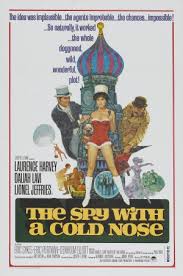
THE SPY WITH A COLD NOSE
UK, 1966, 93 minutes, Colour.
Laurence Harvey, Dalia Lahvi, Lionel Jeffries, Eric Sykes, Eric Portman, Denholm Elliot, Colin Blakely, Robert Flemyng, Robin Bailey, Paul Ford, Michael Trubshawe.
Directed by Daniel Petrie.
The Spy With A Cold Nose boasts a very strong cast led by Laurence Harvey, many British character actors and comedians. The film was written by Ray Galton and Alan Simpson, prolific writers for television for Tony Hancock, Steptoe and Son, Frankie Howerd and of such films as The Wrong Arm of the Law and the Frankie Howerd films, Up Pompeii and Up the Chastity Belt.
This is obviously a James Bond spoof, coming after several of the James Bond films like Doctor No and From Russia with Love in the early 1960s.
The Spy With A Cold Nose is of course a dog, a British bulldog with a tracker in its nose. Sent to Russia, it is taken everywhere by one of the Russian officials so that information comes back to England and Russian spies are rounded up. However, to counteract the influence of the dog, the Russians send a glamorous spy, Dahlia Lavi, to wreak havoc with the mild-mannered Lionel Jeffries.
Not a particularly startling film – but, in retrospect, a chance to see the reaction to the James Bond films, the spoofs, as well as a number of very popular actors doing their thing.
1. The indication of the title and its tone? The humour? The pre-credits sequences?
2. How succesful a comedy was this? How enjoyable? What were its major comic qualities? Situations, dialogue, parody, farce, perfoinances?
3. How successful a spoof of spy films was this? The parody of detail and style? The irony of the ordinariness compared with the spectacular spies? This as a highlight of film making in the 1960s? How well has it worn?
4. How enjoyable was the mocking of the spy genre? The pointing up of the popular beliefs of spying ? Some of the realities? The comic overtones of spying? She expectations of audiences for spy entertainment? How these were mocked by the spy being bumbling? How serious the the use of politics and its portrayal in spying? (The acid in the humour?)
5. How was this typical British satire? The English types that were mocked? The world of the English and their love for animals? Especially medical attention for animals? How were the Russians mocked in comparison with the British?
6. How enjoyable was the character of Farquar? Lionel Jeffrey’s style, his flair for comedy and parody? The satire in hie own self importance and ambitions? In the lack of glamour? the details of his home, life, wife and children? His office his deaf secretary? The details of his bumbling and the irony of the ending? What comment was being made on human nature and ambitions?
7. The satire on Trevelyan? Laurence Harvey's flair for comedy?The satire on the womaniser, his humble origins and his snobbery? wanting to be knighted? What satire was most effective in the portrait of this character?
8. Princess as a Russian spy? How conventional? how much more might have been made of this character?
9. Comment on the incidental satire on the British and their attitudes? The office, the decisions, the morality of the detector in the dog? The ambassador in Russia and their being locked in the conference, the dying?
10. How sharp was the observation? Did this make it an ordinary spy comedy or was it much better than average? Why?
Published in Movie Reviews
Published in
Movie Reviews
Tagged under
Saturday, 18 September 2021 19:42
Springfield Rifle
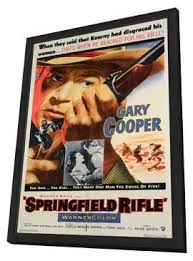
SPRINGFIELD RIFLE
US, 1952, 93 minutes, Colour.
Gary Cooper, Phyllis Thaxter, David Brian, Phil Carey, Paul Kelly, Lon Chaney Jr, Alan Hale Jr.
Directed by Andre de Toth.
Quite an interesting western directed by veteran Andre Toth. Its prime interest is in the performance of Gary Cooper. He made this film immediately after High Noon. Colourfully set during the Civil War period, it shows the origins of intelligence work in the American administration. There is some colourful action with horse-stealing sequences in rugged mountain scenery. Max Steiner contributes one of his thunderous and sentimental scores which certainly sets the mood for the film. The plot itself is quite interesting and at times the film moves with quite some pace.An interesting western of the 50's.
1. An interesting and enjoyable Western? As compared with conventional Western standards, the particular interest of counter-espionage in the Civil War?
2. The contribution of colour photography, Western and especially mountain locations, the musical score?
3. The atmosphere of the Civil War, audience response to the issues of North and South and the varying sympathies? The importance of counter-espionage? How well was this presented in the establishment of the Bureau, the problems, the mystery of the traitor? How did it make the Civil War aspects different from the conventional Civil War film?
4. The title and the focus on the development of the rifle and its use in the Civil War? The importance of horses and their contribution to the waging and winning of war?
5. Gary Cooper's style as Lex Kearney? A conventional hero for this kind of film in the Cooper style? His initial heroism, audience response to his being cashiered? Audience hostility towards Tonnick and his attitudes? The puzzle about Kearney's behaviour, his insolence tovards authoriticap his staying around the tovnt his behaviour in the saloon, his inspection of the horses, ingratiating himself into McCool's favour, the clashes with Hudson, the sentiment in the clashes with his wife and the son and his admiration for his father? Hov well did Kearney's heroism and patriotism appear from this experience?
6. The portrait of Tennick as a jealous fellow officer, mean-mindedness and manoeuvring? The sequence of his following Kearney and the audience thinking he was spying on him and the discovery of the truth, the change of audience attitude? Tennick's heroism and his death for the patriotic cause?
7. The presentation of Hudson as the conventional military leader, his friendship with Kearney, the irony of his being revealed as the villain, his manner of betraying the information about the horses to Mc Cool at the sales, his threatening to execute Kearney, his death? A convincing portrait of a traitor?
8. Mc Cool as the conventional unscrupulous landowner, his calculations about the war, his selling of tho horses and stealing them back, his greed? His grand style at his ranch, home? The reasons for his Springfield rifle, trusting Karney even against advice? His smart strategies and the use of codes? his discovery of the truth, the fight with Kearney, the inevitability of his brutal death?
9. The portrait of Mc Cool’s men especially Pete Elm and his brutal jealousy towards Kearney? his humiliation and death?
10. The quality of the action sequences, the ambushes, the taking of the horses especially over the mountains, the final rescue? Convincing material for this kind of Civil War Western?
11. The vindication of Kearney, the establishing of the Bureau of Counter-espionage, the heroism of the ending with Kearney’s wife and child present? The atmosphere of American patriotism? An enjoyable and interesting Western, the presentation of traditional values?
Published in Movie Reviews
Published in
Movie Reviews
Tagged under
Saturday, 18 September 2021 19:42
Spring and Port Wine
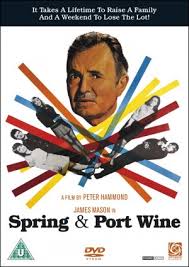
SPRING AND PORT WINE
UK, 1970, 101 minutes, Colour.
James Mason, Susan George, Diana Coupland, Rodney Bewes, Hannah Gordon, Adrienne Posta, Keith Buckley, Frank Windsor, Bernard Bresslaw, Arthur Lowe, Marjorie Rhodes.
Directed by Peter Hammond.
Spring and Port Wine is a look at middle-class or working-class families in Lancashire. The setting is Bolton. James Mason portrays the father of the family with Diana Coupland as his wife. Susan George and Rodney Bewes are among their children.
The film is intended as a down-to-earth look at real life, family relationships, the workplace, tensions.
The film was written by Bill Norton, who came to fame with his screenplay for Alfie. He also wrote the screenplay for The Family Way as well as a sequel to Alfie, Alfie Darling. The film was directed by Peter Hammond who had a thirty-year career in television with only a few feature films, principally Spring and Port Wine.
In retrospect, the film is certainly of its time. However, it also is an opportunity to have a glimpse of what family and working life was like in northern England in the 1950s and 60s.
1. The meaning of the title and its reference? The explanation in the film?
2. The fact that the film was based on a play, Bill Naughton's reputation. his recreation of provincial English towns? The atmosphere, the themE of the provincial town and its effect on people?
3. The realism and the portrayal of character, town, situations? Did the film strive for realism? The blend of realism and optimism within an ugly world? The sentiment and the danger of sentimentality? How rugged and realistic was the realism?
4. The importance of the locations and the colour photography, the skyline of Bolton, the aerial shots, the atmosphere of Lancashire and industry? The music and contemporary tone?
5. The credits, the introduction and expectations? Fulfilled?
6. The initial portrayal of the Crompton family and audiences entering into the family and identifying with it from experience: Mother and her trying to do the accounts, the neighbour and her television not and the loan, Rate and his dominating the household on his arrival, the children and work,, school? The bonds between parents and children? The comparison with the family next door? A neat and tidy house and the importance of appearances, the family eating and singing together, doing things as Rate willed? The appearances of a good and nice family? The reality? How did the screenplay point the irony of appearances and reality?
7. The initial attention given to Mother: Her simplicity, her place in the household, love for her children, respect for her husband, love for him? The importance of money and her being hold to account by her husband? Her kind heartedness after the insults of the neighbour? Her being nice to everyone and to Dad? Her wisdom throughout the film and her support of her children, for example with Hilda and the herring, with Arthur? Florence? Wilt and his crimes? Her being overcome by this at the climax, especially about the coat, her fear and her not knowing what to do in facing the anger of her husband? Her going to the a canal and contemplating death?
8. The portrayal of Florence as the older daughter, saying words of support, yet her love for Arthur and her fear of disobeying her father? Her learning defiance? The bond between herself and Arthur, their searching out the flat, the romanticism of them making love? The choices and her mother giving her approval for her to leave home?
9. The comparison with Hilda and seeing her initially at work, at the party? Her reading of fiction, her embodying all the attitudes of the late adolescent girl and popular magazines? Her pregnancy, her not eating the herring and the confrontation with her father? Her defiance and stubbornness? Her becoming desperate? Her willingness to give in when the herring disappeared? Her decision to go away, the comparison with the family next door and their slovenliness? Borrowing the money? Wanting to go to London? Her support of her mother? The eventual acceptance? A credible portrayal of this young girl?
10. Harry as the older brother and his capacity for laughing yet his fear of his father, for instance the smoking? His defying his father but only so far? His supporting the household, his giving of money? The confrontations and the effect on him and his decision with Wilt to leave home?
11. The portrayal of Wilt an the young boy, his joking, his boyishness? His attitudes within this family? Jokes? His understanding at his brother and sisters? The importance of his giving the herring to the cat and the confrontation with his father? The importance of the tainting fit? His decision to leave home and its importance to him even though he and Harry had no practical plans?
12. The build-up to Dad and his expectations? His various mannerisms and his explanation of his own background and his reacting against it? Turning off the television, his criticisms of popular fiction, his needing of silence, his not wanting smoking, his reference for the Bible, his distinction between fact and truth, his remembering the old days, his pride in his family and building things up, his supervision of money? Family song? The importance of the confrontation over the herring? The visualising of this in the collage of meals and the various contracts of meals with the herring? His walks in the countryside, his love for the Messiah, his buying himself a good coat? The confrontation with Arthur? The build-up of tension? The oath for Wilt telling the truth and people reacting against him? The hard side of his character and his bullying? A credible father?
13. The importance of Arthur as someone coming from outside? The sequence of the advice given about marriage, his paying court, his feeling alien within the family circle and Rate's pride against him? His love for Florence, their making love, preparations for the house? The confrontation and straight talk to Rate and its effect?
14. The comparison with the neighbours and their harshness? Yet their accepting Hilda for the night? The importance of the egg? The neighbour's wife helping with pawning back the coat?
15. The symbolism of the coat precipitating the crisis? The build-up of suspense with the sons urging Dad to wear the coat and Mother wanting to conceal the truth?
16. The pathos of her going to the canal and her desperation? The importance of Rate finding her? Their communication at the canal credible, a basin for the future?
17. The resolution seemed very pat. Was it too easy? The revelation of the benign side of Rate - too quickly? The fact that he knew what was going on all the time and yet dominated with his own attitudes?
18. How much insight into human nature and families from this story? Audience identification and realism? Optimism? A modern fable in a modern setting for understanding?
Published in Movie Reviews
Published in
Movie Reviews
Tagged under
Saturday, 18 September 2021 19:42
Sporting Club, The
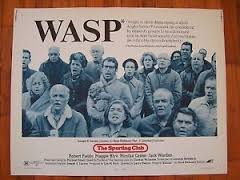
THE SPORTING CLUB
US, 1971, 102 minutes, Colour.
Robert Fields, Nicholas Coster, Margaret Blye, Jack Warden, Richard Dysart, Logan Ramsay, Ralph Waite.
Directed by Larry Peerce.
The Sporting Club is quite a disturbing film – not the kind of easy film that the title might lead us to believe.
The film focuses on some 1970s macho friends, angry, gun-loving, setting up duelling pistols …
They belong to a local club which is about to celebrate its centenary.
The members are well-to-do, they are the direct descendants of the founders of the club with hereditary membership. They are essentially conservative, respectable – although, in the club, they shed some of their inhibitions.
When they open the time capsule of the founders of the club they find, to their shock, that it was a group of radicals, free love supporters. The effect on the club members is to let go of all their inhibitions and indulge in orgiastic behaviour.
This was a film of the early 1970s, heralding a kind of permissiveness – but commenting on the double standards of many respectable Americans and their 19th century background.
The film was directed by Larry Peerce who made such films as Goodbye Columbus but whose later career was mainly in television films.
The background of the film is quite strong in terms of a novel written by Thomas McGuane? whose other novels were filmed: Rancho Deluxe, Ninety-To? in the Shade (which McGuane? himself directed), The Missouri Breaks, Tom Horn, Cold Feet. The screenplay was directed by Lorenzo Semple Jr, one of the most prolific Hollywood writers of the 1970s: Pretty Poison, The Marriage of a Young Stockbroker, Papillon, The Paralax View, The Drowning Pool, Three Days of the Condor, King Kong.
1. A good film? Critics were mainly hostile, also audiences? Why? Impact on an American audience, non-American audience? Reaction to the film itself , its themes, the treat¬ment?
2. How fair should the fima be seen as realistic? As allegorical? How different is the respoasea to the film as realistic, as allegorical? Why?
3. The fila is reflecting America about 1970; self-hate, suicidal, immoral? The immor¬ality underneath the surface and its breaking forth? The impact of America's past on its present? If it so reflects 1970, does it run the danger of being dated?
4. Colour, locations, music? The establishing of a nice atmosphere, respectable? WASP? And then the transition to Vietnam, the orgy?
5. How well did the film focus on Stanton, Quinn, Jamey? Could the audience identify with each of those? Understand them? As characters in themselves? Their relationship with each other? Their place in the sporting club, in society as representing young adult American values? The film’s being in favour of them, against?
6. The title of the film and its focus on the club, a WASP club, its traditions, the respectable people and their professions, their values, way and style of life? Their being horrified by Stanton's erratic behaviour? By his bringing in of Earl Olive? By the violence at Olive and his gang? Their reaction to youth? The ultimate exposure of the club and the club members as hypocrites? The respectabitity of the surface of a hundred years ago, of 1970? The same ugliness and lack of control underneath? The irony of the buildup to the centennial celebrations?
7. The impact of the the capsule and the invitation to throw off all pretences? The ugliness of the orgy? The physical ugliness, a portrayal of corruption? How valid a criticism of American society?
8. The focus of the film on Earl Olive as a character in himself, being employed, his job and his administration of it, as a symbol of the ugly evident disruptive aspects of society? The duel, his blowing up the dam, his friends and their licentious behaviour, the provocation? The inevitability of a war between Olive and the respectible citizens?
9. How well did Stanton cope with the situations, his semi-madness in himself, his detesting the older members in their snobbery, his baring his behind, fighting Olive? paying him off? The contrast with Quinn? The relationship with Jamey? the buildup to the duel and Stanton's death? The impact on Quinn and Jamey and the film ending with this?
10.The physical blowup, explosion, violence as a symbol of the human blowing up? How much insight by this exploration of American society? What was achieved by this film?
Published in Movie Reviews
Published in
Movie Reviews
Tagged under
Saturday, 18 September 2021 19:42
Spoilers, The

THE SPOILERS
US, 1955, 84 minutes, Colour.
Jeff Chandler, Anne Baxter, Rory Calhoun, Ray Danton, Barbara Britton.
Directed by Jesse Hibbs.
Based on a popular Rex Beech story about Alaska. Beech and Jack London provided many stories for films and their remakes over many decades. The Spoilers featured Marlene Dietrich, John Wayne and Randolph Scott in the early forties. This is a more modest remake. The director is Jesse Hibbs, maker of a number of Audie Murphy westerns. However, the atmosphere is enjoyable, the acting of Anne Baxter in the Dietrich role very entertaining and Jeff Chandler makes a solid hero. The film has a straightforward approach to its plot, characterisation and themes and is typical of the colourful adventures made by Universal Studios in the early fifties.
1. How enjoyable a western, frontier film? The background of the opening up of Alaska? The American frontier and heritage?
2. The action films of the fifties and their conventions? Colour photography, music? Studio sets? Action adventure? The stars? The popularity of Rex Beech and his frontier stories?
3. The atmosphere of 1899 and the United States, the opening up of the frontier, the remoteness of Alaska, gold and the number of diggers coming in? The repetition of the opening up of the west? An atmosphere of greed, power, the need for lay and justice, violence and a frontier society?
4. The film's focus on Cherry? Anne Baxter and her style in this role? Her character, manner of speaking, the girl from the saloon? Her colours - especially cherry? Her biting remarks? Her friendship with Duchess and the humour of her support? The infatuation with Blackie, Roy? The hostility towards Miss Chester? McNamara? Her interest in the saloon, the gold mine? Her exercise of power and of her wiles? The court sequences? her involvement? her reaction to injustice, helping Roy escape? Alex being in the room and detaining him there? The fight at the end? The happy ending? A woman of the frontier - character, type?
5. Roy as hero - preparations for his arrival, the background of the mine, Dexter? Claims? Miss Chester and her reliance? Roy and trying to get into Cherry's good books? The mistakes about letting the safe go to the bank? The court sequence? The robbing of the safe, his arrest, the escape? The siege at the mine? The big fight - a western hero?
6. McNamara? and his power? suavity, attraction towards Cherry, the truth and his beirig in league with the group? The fight? The smooth western villain?
7. The criminal group: the judge and his pretences, Helen and the set-up, the lawyer? The plans, the plan to escape?
8. The picture of the miners, the drinking and the shooting in the streets, the claims, the judge and his depositions, working the claims, violent defence, the court sequences, Dexter, the siege?
9. A popular picture of frontier life and its toughness? Conventional action but enjoyable?
Published in Movie Reviews
Published in
Movie Reviews
Tagged under
Saturday, 18 September 2021 19:42
Splendour
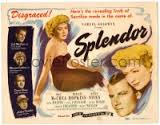
SPLENDOUR
US, 1935, 75 minutes, Black and white.
Joel Mc Crea, Miriam Hopkins, David Niven, Helen Westley, Billie Burke.
Directed by Elliot Nugent.
A thirties soap opera par excellence. A Samuel Goldwyn production, directed by actor-director Elliott Nugent who was to direct many entertaining films in the forties like The Male Animal and Welcome Stranger, the film teams Joel Mc Crea and Miriam Hopkins who had been in so many films together in the thirties. David Niven also appears in an early role.
The treatment is solemn especially in its presentation of American wealthy families and their snobbery and the contrast with the poor. The film shows the effect of the influence of the Hayes Office and while the story has its sordid tones, these are merely suggested. The popularity of this kind of film has continued over the decades and is in many ways very little different from the soap operas of the sixties and seventies. However, the title and the language of the screen play give it a ‘noble’ tone.
1. The qualities of thirties' soap opera, its appeal at the time, its impact now? How dated? The perennial values and the perennial themes for interest? How seriously did it take itself at the time?
2. The title. its tone and significance, Phyllis's statement of it at the end? Its reinforcement of her moral stances?
3. Black and white photography, production values, score? The stars in their time?
4. An American story - the parallels with similar British stories? The contrast of the wealthy class with the working class? The presentation of snobbery, the idle rich, gambling and their manipulating others? The contrast with the working families? The attitude of the screenplay towards the family? Its critique?
5. The mother and her push, her background, the wealth that she inherited from her husband, the style of life she was used to, her attachment to her home? Her expectations about her children's marriages? Her disappointment with her daughter, her manoeuvring of Brighton? Her daughter's bitterness? Clancy and his gambling and his offhanded attitude towards her? Her manipulation throughout the film especially her twisting Phyllis and forcing into situations and then not taking the blame? The contrast with her daughter and her bitterness and her moral stances? Clancy and his gambling, arrogance, comparison with Brighton, borrowing from Phyllis? Brighton's punching him at the end? How did the audience want to see this family get its ‘comeuppance’?
6. Joel McCrea’s? style an Brighton? As the hero, his capacity for writing, the reasons for his marrying Phyllis, the possibility of his marrying Edith? His preoccupation with career, money, goals? His motives? His blindness towards Martin and Phyllis? The Mexican job and his self-satisfaction? His realization of the truth, his being hurt, the clash with Phyllis? His finally leaving her out? A credible hero? The moral behind his portrait?
7. Phyllis as heroine? Her background, love for Brighton, her reception into the family, the questioning of her motives? Her attempts to show her love for Brighton? Her being caught by the family and their pressures? Her succumbing? Relationship with Martin, enjoyment of his company, for example the car ride? How much choice did she have? The treatment of the affair by innuendo and suggestion rather than explicitly in the screenplay? The rumours, Brighton's mother and her disregard of these, the daughter and her criticism? The pain in her giving in to Martin for Brighton's sake? Her telling the truth? her work, friendship with Edith? The end and her statement about splendour? A credible heroine? The moral in her character?
8. Audience interest in the basic situation, career and wealth, the moral choices for Phyllis? The response to the suggested treatment?
9. The portrait of Martin - divorced, businessman, no illusions, his propositioning of Phyllis, his love for her, using her? His coming to visit her while she was working and his proposal?
10. The social set in which the family moved, the gossiping and giggling woman? The critique of the family by showing their behaviour and exaggerating it?
11. Themes of society, wealth and luxury versus the ordinary? How real is this picture of society, how much the fantasy world of American soap opera?
Published in Movie Reviews
Published in
Movie Reviews
Tagged under
Saturday, 18 September 2021 19:42
Spiral Road, The
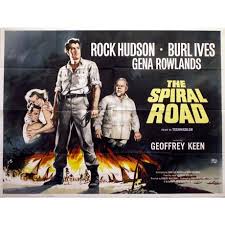
THE SPIRAL ROAD
US, 1962, 145 minutes, Colour.
Rock Hudson, Burl Ives, Gena Rowlands, Geoffrey Keen, Neva Paterson, Philip Abbott, Karl Swenson, Robert F. Simon.
Directed by Robert Mulligan.
Robert Mulligan was a strong television director who moved into films with Fear Strikes Out with Anthony Perkins in 1957. It was a striking and powerful film debut. In the early 1960s he moved into continual film-making until the early 1990s. Some of his films in the 1960s were very strong including Inside Daisy Clover and, the film immediately after The Spiral Road, the classic To Kill a Mockingbird.
The film is based on a novel by Wim De Hartog, critics likening its themes to those of Joseph Conrad’s Heart of Darkness in which people are immersed in the jungle, face themselves, their demons, the realities of colonialism, Christian missionaries, the strictness of a Calvinist code, and try to come to terms with all of these issues.
Rock Hudson is good as the doctor, involved in this personal search. He is associated with Burl Ives as another doctor. Gena Rowlands, early in her career, is the female interest.
The film probes deep issues, the meaning of existence as well as the role of God in human life. It is an interesting drama, colourful in its settings, worthwhile in its intelligent challenges.
1. What was the overall impact of the film? In terms of enjoyment, interest, message film, humane film?
2. How do audiences respond to such humane themes as medicine, Java in the thirties, the power of healing? The religious themes of God and the explanation of the title?
3. The contribution of the colour, the East Indies in the thirties, the atmosphere of a remote outpost and colony in need?
4. The length of the film, the grandeur of its scope, the exploration of character and theme?
5. How well did the film communicate the atmosphere of Java in the thirties, a colony of Holland, doctors at work and going out from the motherland, Batavian society, plagues, the dangers of alcoholism, voodoo terror, the crises in the life of those in the remote villages, the dangers from the nations, the missions?
6. How interesting a character was Anton? How much of an Everyman figure? The film's presentation of him as young and ambitious, manoeuvring his way to Dr Jansen, his independent ways, the gradual change through experience, the enthusiasm of his love for Els, his successes and failures? When did he begin to change and begin to fail? His liaison with the native girl? His arrogance towards Jansen and the book? Could he not relate to Els? His decision to go back alone? The terror, the drinking, the madness? The aloneness in the jungle and the equivalent of Robinson Crusoe surviving? The experience of God and his nothingness? His coming to his senses?
7. What was the main experience that the film presented in Anton’s life? His coming out of himself, the experience of his own inadequacy, the symbol of modern man confronted with himself, the world, God?
8. Anton as a doctor: his work with the lepers, the plague? His professional skills and their success? As not being enough?
9. The portrayal of Dr. Jansen? Burl Ives’ style and appeal? The humour and worldly wisdom, the experience and dedication? The humour and the realism of the encounter with the Rajah? Hie friendship with the missionaries? His seeing through Anton? His wanting to help Els? His ultimate helping of Anton?
10. The film's portrayal of the doctors and their organisation in Java? Headquarters and the contact? Native doctors?
11. Els as heroine? How convincing? Her love for Anton, support of him, the growing gap, her inability to hold him, her continued support, hope for the future?
12. The importance of the encounter with Froelich? Their discussion, the intervention of the Salvation Army Missionary, encountering Froelich again, shooting him in desperation, Anton’s finally becoming like him?
16. The picture of the missionaries? The presentation of the Salvation Army? The leper station, the wife being a leper? The effect on Anton?
14. Comment on the visualising of an interior struggle in Anton, especially in his grotesque look as he was alone, surviving in the jungle, terrorised by the natives, Burubi and the menace? The nature of Anton's regeneration?
15. How valuable a presentation of important human themes was this?
Published in Movie Reviews
Published in
Movie Reviews
Tagged under
Saturday, 18 September 2021 19:42
Spiral
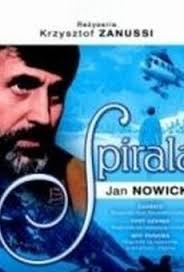
SPIRAL
Poland, 1978, 83 minutes, Colour.
Jan Nowicki.
Directed by Krysztof Zanussi.
Aa Polish psychological drama. Directed by the prolific Polish director, Krysztof Zanussi, it is made up of two parts. The first shows a depressed stranger encountering people at a ski resort and then being lost in the mountains with the people searching for him. The second part is his decline and suicide in a psychiatric ward in the city. The claustrophobic presentation of the second part is in marked contrast with the beauty and isolated grandeur of the mountain scenery.
The film is perceptive on the presentation of a depressed character and his inability to cope with life. The film is strong in its criticism of current hospital practice, the use of drugs and the treatment of psychiatric patients. The film is a grim look at a contemporary social and medical health problem.
1. An interesting psychological drama? Its overall impact? For what audience? The points being made about illnesst death?
2. The Polish atmosphere of the film? The presentation of the mountain scenery for the first half of the film and its authentic atmosphere? The contrast with the claustrophobic effect of the hospital in the second half? The finale with the hero disappearing in the mountain landscape?
3. The significance of the title, its reference to Piontek? Indication of themes. illness, death?
4. The introduction to Piontek? His arrival at the resort, the bridge, his kicking the keys over the ravine, his presence at the inn? The details of his encounter with the various people, their recognizing him and his putting them off, his ways of alienating them? The woman waiting, the young people and their discussionsand his interruption and contradictions, the sympathetic couple, the old man with the wood etc.? How well did this delineate his character? Indicate his illness, his torment?
5. The contrast with the ordinary people at the inn? Those who were favourable towards him, those with unfavourable reactions? Their interests, enjoyment of lifey capacity for relationships? Their being insulted by him and their reaction?
6. His being lost on the mountains, the depression, the impulse towards suicide? The detailed presentation of the search - the people searching in the snow, the many helicopter sequences, his discovery, the rescue itself? The importance of the varying moods of the weather and the mountain landscapes?
7. How well did the film communicate the experience of depression, its nature?
8. The transition to the second part of the film and interiors? The discussion about Piontek, the analysis of his background, illness, depression? The various attitudes of the staff towards helping him, tests, meditation?
9. Sympathy towards him an he lay in hospital, the experience of the mountains, the search, his pain? His impending death and his reaction to this? Mental illness? The sympathetic staff? The visit of the woman whom he had rebuffed and her kindness? His ability to communicate his feelings, inability?
10. Did the visit of the woman help in communication, sympathy?
11. The film's tracing his decline?
12. The build-up towards his death, unwrapping the bandage, locking the nurses in the room, falling out the window. his lying in the snow and the various people gathering?
13. A portrait of an individual, a picture of society, physical and mental health, psychology?
Published in Movie Reviews
Published in
Movie Reviews
Tagged under
Saturday, 18 September 2021 19:42
Spencer's Mountain

SPENCER'S MOUNTAIN
US, 1963, 118 minutes, Colour.
Henry Fonda, Maureen O’ Hara, James Mac Arthur, Donald Crisp, Wally Cox, Mimsy Farmer, Virginia Gregg.
Directed by Delmer Daves.
Spencer’s Mountain is one of the many films made by Delmer Daves during the 1960s, very emotional, pieces of Americana, whether in the present (A Summer Place, Susan Slade) or in the rural past as in Spencer’s Mountain.
The film focuses on a family with archetypal parents: Henry Fonda and Maureen O’ Hara. James Mac Arthur who had appeared in a number of Disney films including The Swiss Family Robinson is their son. Oscar-winning Donald Crisp (How Green Was My Valley) is the grandfather.
The film is very warm in its presentation of the family, of conflict, of survival, of growing up, of family relationships. This is a fine example of Hollywood wholesome film-making with sentiment.
1. Audience responses to this film? The fact that it was particularly American?
2. The importance of colour, panavision, musical score, locations, the atmosphere of the mountain and the valley, the importance of the opening and the description of Spencer’s mountain?
3. The significance of the mountain, the fact that it was the heritage of the family, the pioneering and the valley, its isolated and enclosed nature, its relationship to the rest of the state?
4. The mountain as a symbol for the dreams of the family, the presentation of their actual poverty, the importance of their hopes, their dream home being built, the way that it was finally burnt down, for a different
dream, for reality?
5. The importance of the sequences of the way of life for the whole family? The influence of the generations, the presence of the grandparents in the house and what they stood for, the mother and father and their pioneering, building, making a home? The nature of the house, the work that all the family had to do, the large family and the role of the children, the details of the way of life?
6. A code according to which the family behaved, particularly American and loyal, traditional, the role of religion, the role of properness and propriety?
7. The cultural gap in the family, the education of the grandparents, the parents and their never having left the valley? Clayboy and his ambitions to leave and the way these were expressed? The admiration for education, especially by his mother, education and freedom and the limitations of poverty and opportunity?
8. How well did the film draw the characters of Clay and his wife? Their values their beliefs, their love for one another their loyalty to their parents, their devotion to their children and their hopes for them? Their way of training? Scenes at work, meals?
9. The film's focus on Clayboy? The eldest son? His status in the family, his work and the ordinary things he had to do for the other children? The importance of his graduation, the great speech that his teacher gave? The hopes, the scholarship, the work in the library? His relationship with Clarice? The hopes that he would go far, change? The importance of Clarice sharing this love, growth, study?
10. The role of Miss Parker and her teaching him? The importance of her speech, arranging the scholarship? If she had failed, would she have ruined his life by education?
11. The Reverend and the humour of his entry into the town, meeting Clay, fishing and drinking, the satire on the boycott on the church, Clay's blackmailing the people to go? The growing friendship? The irony of the Reverend blackmailing Clay about the Latin?
12. The contribution of the minor characters, for example, the doctor, the neighbours?
13. The film’s presentation of the values of family life? Education? Loyalty to America? the singing of the anthem on graduation day?
14. The presentation of the world of the university? Clay's visit to the Dean and his explanation of himself? His tenacity, ambitions for the boy? The attitude of the University in accepting Clayboy?
15. How much sentiment was their in the film? How wholesome the values presented? The appeal of the film? As a presentation of the real world?
Published in Movie Reviews
Published in
Movie Reviews
Tagged under
Saturday, 18 September 2021 19:42
Spell, The

THE SPELL
US, 1977, 86 minutes, Colour.
Lee Grant, Susan Meyers, Lelia Goldoni, Helen Hunt.
Directed by Lee Philips.
A telemovie which is a spinoff from Carrie. It starts very similarly to Carrie but moves more towards a theme of the occult. There is a school girl heroine who has mystertous powers - for destructhon. While Carrie's mother was a religious fanatic, Rita’s mother is much more humane although she also has religious powers. The film looks too much like an imitation Carrie at first but then moves off with a life of its own, quite enjoyable and interesting but adapted to home viewing which takes some of the crunch out of it. Lee Grant is very strong as the mother. Enjoyable and interesting as a televIsion adaptation of the movie themes of the mid seventies.
1. An enjoyable and interesting telemovie? The use of television techniques? in terms of suspense and continued interest? how well did the screenplay adapt the seventies' cult themes for home viewing?
2. The quality of the film and its screen play, its being derived from the genres popular in the seventies, people's expectations? Did the film after taking its derivations move to a lifd of its own or not?
3. Audience response to the occult, to spells and psychic powers, to ordinary people as mediums of this power? How credible were these themes and their presentation? Do people really believe that such events can happen and such powers exist? In the middle of ordinary towns and homes?
4. The film using the techniques of mystery and sudden revelations about what Rita was doing, the powers of the gym, Marion’s own powers at the end?
5. The portrait of American family life, school life? Bonds of love, tensions, dislike and even hatred? Parents and their relationship to their children? Children and their relationship with one another? The uglier aspects of the tensions within family life and the repressed vengeance? Revenge?
6. Glen in himself, his role in the family, his favouring Kristina, his ridicule and offending Rita? The growing bitterness towards Rita? The contrast with Marion and her influence in the house? Her love for her daughters? For Glen? His build-up to the vengeance being exercised within the family?
7. How well did the film depict Rita: fat, the girls ridiculing her in the gym, her being hurt and vengeful? The importance of her malicious looks? The gym sequence and the fall of the girl, the build-up to the other deathd, the threat to Kris as she was swimming, the appearances of Rita’s face in these crises situations?
8. How well did the film explain Rita’s power, the revelation that it was the gym mistress with the powers and who communicated them to her, the nature of the spell and the incantations etc.? The confrontation with the mistress? Marion following her and the confrontation with Rita and Marion, the smashing of things in the house and Marion winning? What did this reveal about psychic power and mediums?
9. The visual presentation of deaths and their horror? The reaction of the expert on the psychic and occult and his comments on the death, his explanations to Marion?
10. The film finishing with a balance of power? A temporary peace, the potential for further eruptions?
11. How credible was the basic plot, the characterization? A glance at American society in the seventies, the preoccupation with the occult?
Published in Movie Reviews
Published in
Movie Reviews
Tagged under